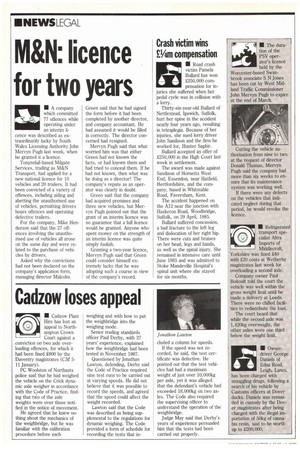Cadzow loses appeal
Page 32

If you've noticed an error in this article please click here to report it so we can fix it.
• Cadzow Plant Hire has lost an appeal to Northampton Crown Court against a conviction on two axle overloading offences, for which it had been fined 2800 by the Daventry magistrates (CM 511 January).
PC Woolston of Northants police said that he had weighed the vehicle on the Crick dynamic axle weigher in accordance with the Code of Practice, finding that two of the axle weights were over those notified in the notice of movement.
He agreed that he knew nothing about the mechanics of the weighbridge, but he was familiar with the calibration procedure before each weighing and with how to put the weighbridge into the weighing mode.
Senior trading standards officer Paul Derby, with 37 years' experience, explained how the weighbridge had been tested in November 1987.
Questioned by Jonathan Lawton, defending, Derby said the Code of Practice required nine test runs to be carried out at varying speeds. He did not believe that it was possible to record the speeds, and agreed that the speed could affect the weight recorded.
Lawton said that the Code was described as being supplemental to the regulations for dynamic weighing. The Code provided a form of schedule for recording the tests that in eluded a column for speeds.
If the speed was not recorded, he said, the test certificate was defective. He pointed out that the test vehicles had had a maximum weight of just over 10,000kg per axle, yet it was alleged that the defendant's vehicle had exceeded 18,000kg on two axles. The Code also required the supervising officer to understand the operation of the weighbridge.
Judge May said that Derby's years of experience persuaded him that the tests had been carried out properly.
































































































































